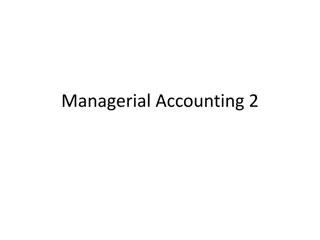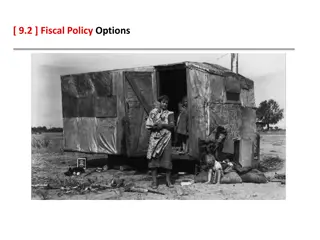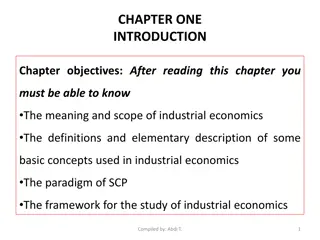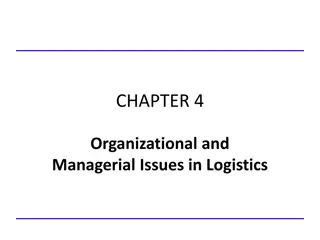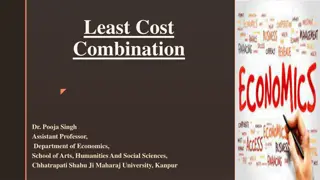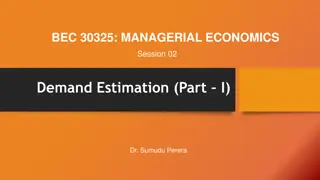Managerial Economics: A Comprehensive Overview
Managerial Economics delves into the application of economic concepts in business decision-making. It bridges the gap between theory and practice, aiding managers in optimizing resources and achieving organizational objectives. The scope covers various aspects such as national income, employment, monetary theory, and more, providing a holistic approach to economic analysis in a business context.
Download Presentation

Please find below an Image/Link to download the presentation.
The content on the website is provided AS IS for your information and personal use only. It may not be sold, licensed, or shared on other websites without obtaining consent from the author.If you encounter any issues during the download, it is possible that the publisher has removed the file from their server.
You are allowed to download the files provided on this website for personal or commercial use, subject to the condition that they are used lawfully. All files are the property of their respective owners.
The content on the website is provided AS IS for your information and personal use only. It may not be sold, licensed, or shared on other websites without obtaining consent from the author.
E N D
Presentation Transcript
A Systematic Approach to Managerial Economics Promod Gopal Asst Prof of Commerce
Economics Meaning: Economics is a social science concerned with the production, distribution, and consumption of goods and services. ... Economics can generally be broken macroeconomics, which concentrates on the behavior of the aggregate economy, and microeconomics down into
Micro Economics It is a branch of economics that studies the behaviour of individuals and firms in making decisions regarding the allocation of scarce resources and the interactions among these individuals and firms. Eg. Demand of product, supply,price etc
Macro economics It is the branch of economics concerned with large-scale or general economic factors, such as interest rates and national productivity. Macro economics is a branch of economics dealing with the performance, structure, behavior, and decision-making of an economy as a whole
Managerial Economics Meaning: It is the application of economic concepts ,theories ,tools and methodologies problems in business. It enables decision making. to solve
Objectives of Managerial economics 1.Incorporates useful ideas 2.Veriety decisions 3.Acts as an integrating agent 4.Competent Model Builder 5.Suitable tool kit.
Scope of Managerial economics 1. National Income 2.Employment 3.Monetary theory 4.Business Cycle 5. International Trade 6.Theory of economic growth
Scope of Managerial economics 1.Production Theory 2.Demand Theory 3.Pricing theory 4.Cost analysis 5.Profit Management 6.Inventory Management
Managerial VS traditional Economics 1. The traditional Economics has both micro and macro aspects whereas Managerial Economics is essentially micro in character. 2. Economics is both positive and normative science but the Managerial Economics is essentially normative in nature. 3. Economics deals mainly with the theoretical aspect only whereas Managerial Economics deals with the practical aspect. 4. Managerial Economics studies the activities of an individual firm or unit. Its analysis of problems is micro in nature, whereas Economics analyzes problems both from micro and macro point of views.
Role of managerial economist He studies the economic patterns at macro-level and analysis it s significance to the specific firm he is working in. He has to consistently examine the probabilities of transforming an ever-changing economic environment into profitable business avenues. He assists the business planning process of a firm. He also carries cost-benefit analysis.
Demand Meaning: Demand is an economic term that refers to the amount of products or services that consumers wish to purchase at any given price level. Demand is an economic principle referring to a consumer's desire to purchase goods and services and willingness to pay a price for a specific good or service
Factors affecting demand 1. Tastes and Preferences of the Consumers: 2. Income of the People: 3. Changes in Prices of the Related Goods: 4. Advertisement Expenditure: 5. The Number of Consumers in the Market: 6. Consumers Expectations with Regard to Future Prices:
Law of Diminishing Marginal Utility The Law Of Diminishing Marginal Utility states that all else equal as consumption increases the marginal utilityderived from declines. Marginal utilityis derived as the change in utility as an additional unit is consumed. states that all else equal as consumption increases the marginal utility derived from each additional unit declines. Marginal utility is derived as the change in utility as an additional unit is consumed. Utility is an economic term used to represent satisfaction or happiness. each additional unit








